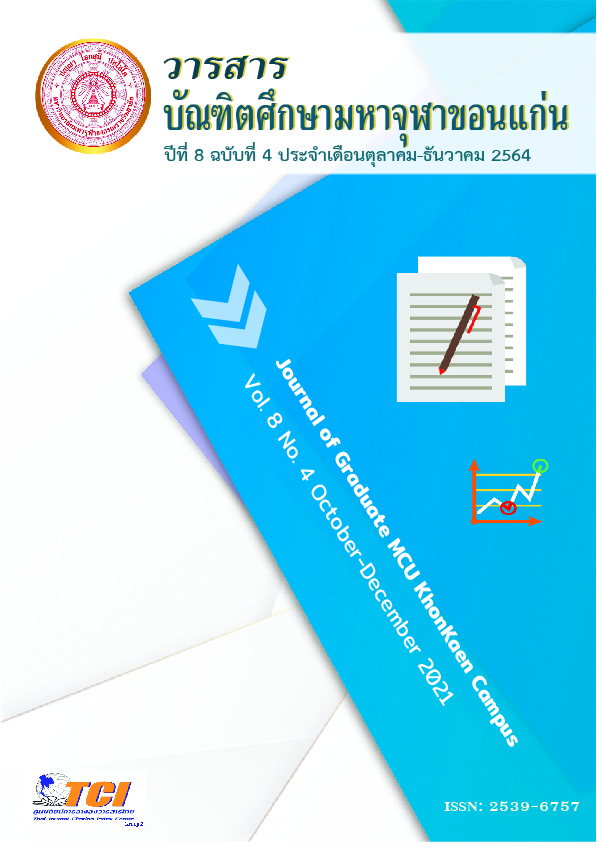DEVELOPMENT OF CARE MODEL WITH BUDDHIST ETHICS FOR CANCER PATIENTS IN KHON KAEN HOSPITAL
Main Article Content
Abstract
The objectives of this research were: 1) to study the problem condition of caring
for cancer patients receiving chemotherapy in Khon Kaen Hospital; 2) to develop a
model of caring for cancer patients with Buddhist ethics; 3) to study the results of the
development of a cancer patient care model with Buddhist ethics in Khon Kaen Hospital.
The research tools consisted of a questionnaire, an interview form, an observation form.
There were 58 participants and the quantitative data were analyzed by Percentage, Mean,
Standard Deviation; while, the qualitative data were interpreted by descriptive analysis
based on the inductive method.
The research results were as follows:
1) The problems in caring for cancer patients involved physical complications.
Patients were able to take care of themselves, but their mental, social, spiritual deficits
can be seen. Besides, economic problems affected their follow-up treatment. Patients
had frequent self-care behaviors (=3.95, SD=0.66), and also had determination and
patience to receive treatment even if they were discouraged from the pain of treatment.
Patients and their relatives saw that the nurses were attentive, determined and patient.
The nurses provided holistic nursing care with dedication, patience, and taking time to
take care of the patients. Nurses who had frequent behaviors to take care of patients
(=3.87, SD=0.84) had a lot of workloads, tired and worked under stress and pressure.
2) The care model for cancer patients is an activity for patients each day by providing
nursing care to patients receiving chemotherapy, providing advice on disease, treatment,
complications, and behavior according to Gharvsadhamma (Virtues for a Good
Household Life) by participating in the group discussion and listening to the Dhamma
before going to bed.
3) The results of development revealed that the patients were able to take care
of themselves on a regular basis (=4.21, SD=0.63). The patients had a high level of
self-care knowledge (=3.98, SD=0.67), and had a strongly agreeing attitude (=4.41,
SD=0.56) towards self-care, honesty, determination, patience, while nurses were determined,
cared, devoted to taking care of patients, were patient, sacrificed, and indomitable to
obstacles. These were frequent behaviors (=4.15, SD=0.65).
Article Details
References
เทอดศักดิ์ ปฏิภาณวัฒน์. (2557). ศึกษาวิเคราะห์ความสัมพันธ์ระหว่างโรคตามหลักเวชกรรมแนวพุทธ กับการรักษาพยาบาลตามแนวแพทย์แผนไทย. กรุงเทพมหานคร: มหาวิทยาลัยมหาจุฬาลงกรณราชวิทยาลัย.
ปิยะวรรณ โภคพรากรณ, สุชิรา ชัยวิบูลย์ธรรม และ วิไลลักษณ์ ตันติตระกูล. (2560). ความสำเร็จในการสร้างเสริมสุขภาวะผู้ป่วยมะเร็งระยะท้ายในสถานบริการสุขภาพโดยองค์กรทางศาสนา : กรณี อโรคยศาล วัดคำประมง สกลนคร. วารสารพยาบาลกระทรวงสาธารณสุข, 27(2), 198–213.
พรทิพย์ ปุกหุต และทิตยา พุฒิคามิน. (2555). ผลของการสวดมนต์บำบัดต่อความวิตกกังวลและความผาสุกทางจิตวิญญาณใน ผู้ป่วยมะเร็งเต้านมระยะรับการรักษา. วารสารสมาคมพยาบาลฯ สาขาภาคตะวันออกเฉียงเหนือ, 30(2), 122-130.
พระปลัดสมชาย ปโยโค (ดำเนิน). (2558). รูปแบบการดูแลผู้ป่วยโรคเรื้อรังเชิงพุทธบูรณาการ. กรุงเทพมหานคร: มหาวิทยาลัยมหาจุฬาลงกรณราชวิทยาลัย.
วิชาฎา อยู่ดวง และคณะ. (2557). คุณภาพชีวิตผู้ป่วยมะเร็งศีรษะและลำคอที่ได้รับรังสีรักษาที่โรงพยาบาลมะเร็งสุราษฎร์ธานี. วารสารโรคมะเร็ง, 35(1), 14-25.
ศิริลักษณ์ วรไวย พระอธิการวงศ์แก้ว วราโภ และภาคภูมิ อินทร์ม่วง. (2562). การดูแลสุขภาพแบบองค์รวมด้วยหลักธรรมโอสถของผู้ป่วยโรคเบาหวาน อำเภอกันทรวิชัย จังหวัดมหาสารคาม. วารสารวิชาการสาธารณสุข, 28(2), 90-100.
ศูนย์มะเร็ง. (2560). วิชาการมะเร็ง โรงพยาบาลขอนแก่น. ขอนแก่น: ขอนแก่นการพิมพ์.
สถาบันมะเร็งแห่งชาติ. (2561). ทะเบียนมะเร็งระดับโรงพยาบาลปี 2560 : Hospital based cancer registry 2017. สืบค้นเมื่อ 3 กรกฎาคม 2564, จาก https://library.mahidol.ac.th/ search/ searchtype=c&searcharg=QZ16.JT3+%E0%B8%AA181%E0%B8%97+2560++&submit=Go
Kemmis, S., and McTaggart, R. (1990). The action research planner. Geelong: Deakin University Press.
Srinagarin Hospital, Khon Kaen University. (2017). Hospital-Based Cancer Registry 2017, 41[Computer Software].

